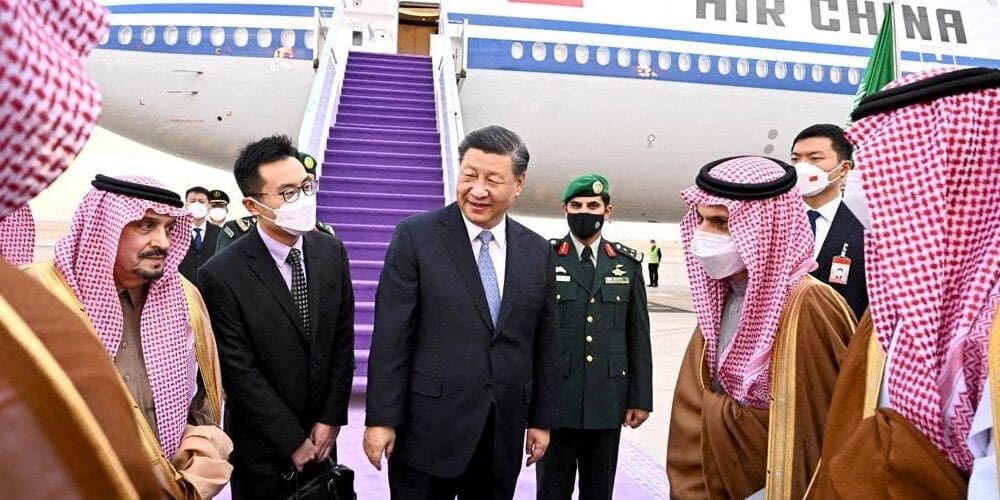The arrival of Chinese President Xi Jinping in Saudi Arabia marks an important moment in the historical relationship between the two countries and their respective regions. While the United States has recently been eager to drive a wedge between its partners in the Persian Gulf and its rival to the East, heads of state from across the Gulf Cooperation Council (GCC) and the wider region headed to the Saudi capital to attend the inaugural China Arab States Summit and sit with the man from Beijing.
The visit is significant both for what it says about the growing importance of the relationship between the two regions, but also for the place of the Middle East in the intensifying competition between China and the U.S.—the longtime security guarantor and preeminent economic partner of the Gulf states. Xi’s trip comes fresh off securing a historic third term as president of China, and is only his third time outside of the country since the onset of the Covid-19 pandemic in January 2020. In addition to a lavish ceremony, his arrival was met with an announcement of nearly $30 billion in prospective deals, as well as a strategic partnership agreement that aligns Saudi Arabia’s Vision 2030 development plan with China’s hallmark Belt and Road Initiative.
In stark contrast, U.S. President Joe Biden visited Riyadh over the summer to shore up ties with the Saudis and other partners in the region, but the trip arguably did more to showcase the tensions in the relationship than it did to ease them, as Biden had clearly intended. In addition to Biden’s low level reception at Riyadh Airport, the relationship hit an even rougher patch after the Saudi-led OPEC+ cartel slashed oil output and sent gasoline prices soaring just weeks before the U.S. midterm elections in November.
Xi’s trip, on the other hand, is in keeping with the growing footprint of China—and that of other Asian economic powerhouses Japan, India and South Korea—in the GCC states and the realignment in Gulf foreign policy that has followed. Indeed, only weeks before, China and Qatar signed a historic 27 year LNG deal at a time when U.S. rhetoric against China is increasingly hostile.
But Beijing is far from alone in making major economic headway in the region. From South Korean construction firms to China’s Belt and Road Initiative, Japanese infrastructure and technology investments and Indian manpower, all the signs are that these links will continue to grow as the world’s economic center of gravity shifts to Asia.
Such ties will become increasingly important for GCC states as they undergo a historic process of socio-economic transition. Lower oil prices coupled with demographic pressures, unemployment and a lack of economic diversification have put enormous strain on public finances. Volatility in the energy markets has created a major impetus for economic diversification across the six GCC countries. The region is set to be battered by climate change over the coming decades, and Asian powers will play a key role as GCC countries address these complex challenges.
But as they become more involved in the region, Asian governments will have to navigate an increasingly complex geopolitical landscape.
Growing U.S.-China competition, ongoing civil wars and unrest in the broader Middle East, disagreements within the GCC, Saudi-Iranian rivalry and heightened tensions over Tehran’s nuclear program: all demonstrate that the four Asian powers cannot limit their engagement to the economic realm, and will have to contribute to the region’s security architecture.
So, what are the Asian powers’ objectives in the GCC region, and how can they achieve them while also contributing to regional security?
Socio-economic Drivers
Asia-GCC cooperation has historically focused on energy. The Asian powers are among the world’s top consumers of hydrocarbons, mainly from the Gulf. However, as both regions are increasingly hit by climate change, the transition towards clean energy is becoming more urgent — and increasingly central to their cooperation. This is likely to grow as the UAE and Saudi Arabia work towards ambitious commitments to hit net zero by 2050 and 2060, respectively.
Indeed, several joint initiatives are underway to help the GCC states diversify their economies and reduce the reliance of all sides on hydrocarbons. Most prominent is the South Korean-led, UAE based Barakah nuclear power plant.
The Barakah project also reflects inter-Asian competition for GCC contracts. South Korea’s KEPCO won the contract to build the plant at the expense of a rival Japanese bid. For Saudi Arabia’s planned nuclear reactor, South Korea will directly compete with China, Russia and others. As economic engagement grows between the GCC and the Asian powers, competition will likely increase across a range of sectors.
The war in Ukraine has also raised key questions around the Gulf’s economic relations with both Asia and Europe, particularly as they relate to energy. Spiking European demand for Gulf oil and gas due to the closure of pipelines from Russia has amplified the GCC states’ geopolitical clout and highlighted their importance to European countries. Russia’s attempt to re-channel its energy exports through India and China could mean Asian energy markets rely less on the GCC. Meanwhile, Gulf cooperation with Europe to address energy shortages will largely be shaped by security and political considerations such as the potential of increased security guarantees from Europe.
Security and Political Dimensions
Gulf security concerns also play a key role in shaping GCC-Asia alliances. America’s gradual retreat from regional security, amidst high levels of instability, is pushing Gulf states ever more urgently to seek new security partners. That has led to new alliances with Asian powers, along with joint military exercises and arms deals. Of course, all this is taking place in the shadow of great power competition, as the U.S.-Chinese rivalry intensifies and extends into the region.
China has stepped up its economic, political and military footprint in the GCC over the past decade. The resulting U.S. concern has led to initiatives such as I2U2– a partnership between India, Israel, the UAE, and the U.S. While the partnership’s goals are economic, it could also help forge security ties between the U.S., the Asian powers, and the GCC. Conversely, President Xi announced the formation of the Chinese-led Global Security Initiative (GSI) earlier this year. The initiative stresses China’s commitment to a “new security architecture” in the Middle East.
As China’s influence expands across the region, there are complexities and limitations to its security presence in the GCC. Namely, it must decide between its stance of non-intervention — which has allowed Beijing to maintain ties with rival regional states — and becoming more involved in GCC security. Seeing as China is primarily focused on the Indo-Pacific region, it is unlikely to shift its focus to the GCC immediately, but it may do so gradually over the coming years.
Outlook: Deeper Engagement But not Without its Challenges
As Xi’s visit to the region highlights, GCC countries are likely to continue to deepen their economic, political and security partnerships with Asian countries. While enhancing economic ties is relatively easy, the security landscape is more complicated. As their ties grow with the Gulf, are Asian powers willing to contribute more to regional security beyond limited engagements, and can they step in as the US retreats from the region?
The answer to that is more straightforward for South Korea, Japan and India, as they are US allies and broadly aligned with Washington’s policy towards the region. For China, the situation is more complex given its rivalry with the US. It came as no surprise when President Joe Biden, during his visit to Riyadh in July, said: “we will not walk away (from the region) and leave a vacuum to be filled by China, Russia or Iran.”
Yet China’s growing relationships with Saudi Arabia and the UAE have already caused tensions with the U.S., as Gulf countries continue to balance between the rival superpowers. Such tensions are not going away. Rather, they are likely to grow as the Chinese-U.S. rivalry intensifies. Should China attempt to take back Taiwan over the coming years, GCC countries will be put in a very tough spot with limited room for maneuver between both superpowers.
The opinions expressed in this article are those of the author and do not necessarily reflect the views of the Middle East Council on Global Affairs.



